In the ever-expanding world of podcasting, choosing the right hosting platform is crucial for success. With numerous options available, finding the best podcast host can be daunting. This article aims to simplify the selection process by examining key features, pros, and cons of leading podcast hosting services. Whether you’re a seasoned podcaster or just starting out, understanding the offerings of these platforms can help you make an informed decision to elevate your podcasting journey.
1. Buzzsprout – Best Podcast Host Overall
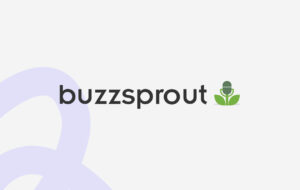
– Trusted provider since 2009
– Free plan with unlimited team member accounts
– Easy embedding on website
– User-friendly analytics dashboard
– Automation capabilities for social media and ads
– Options for audio quality optimization
– Flexible pricing plans
– Vibrant community support
– Top-notch customer service
Buzzsprout, is a top recommendation for podcasters of all levels. First off, Buzzsprout has been in the game since 2009 and is trusted by over 100,000 podcasters worldwide. They’re one of the few hosts that offer a free plan with unlimited team member accounts.
Buzzsprout makes it incredibly easy to embed a podcast player right onto your website, showcasing either a single episode or an entire playlist. Their analytics dashboard is super user-friendly too, giving you insights like listener demographics and even estimating your episode’s reach within the first 90 days.
One of Buzzsprout’s standout features is its automation capabilities. You can clip parts of your audio for social media posts or even automate ads and cross-promotions to keep your content fresh and relevant.
Pricing-wise, they’ve got options for every budget. Starting with a free plan that allows for two hours of content per month hosted for 90 days, you can scale up as your podcast grws. Paid plans range from $12 to $24 per month, offering features like unlimited storage and advanced analytics.
Pros:
– Trusted provider with a long history since 2009
– Free plan available with unlimited team member accounts
– Easy embedding of podcast player on websites
– User-friendly analytics dashboard for insights
– Automation capabilities for social media and advertisements
– Options for improving audio quality
– Flexible pricing plans to suit various needs
– Access to a vibrant community for support
– Responsive and reliable customer service
Cons:
– Free plan has limitations on storage and hosting duration
– Additional costs may apply for certain features like audio quality optimization
– Limited editing capabilities within the platform
2. PodBean – Best Budget Podcast Host
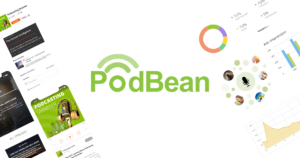
Features:
– Multi-channel distribution to major directories like Apple Podcasts, Spotify, and Google Podcasts
– Detailed analytics including listener demographics and user behavior
– Advanced monetization options such as patron programs, advertising marketplace, and premium content sales
– Integration with social media and marketing tools for enhanced outreach
– Limited audio editing capabilities within the platform
– Support for private podcasting and customizable podcast websites
PodBean emerges as a to contender, simplifying the podcasting process so you can focus on your content. With a user-friendly interface, PodBean streamlines podcast creation, offering a seamless experience from sign-up to publication.
PodBean stands out for its multi-channel distribution capabilities, allowing podcasts to reach various platforms like Apple Podcasts, Spotify, and Google Podcasts effortlessly. Detailed analytics provide valuable insights into listener demographics and user behavior, empowering creators to refine their content strategy.
What sets PodBean apart is its advanced monetization options, including a built-in patron program, advertising marketplace, and premium content sales. Integration with social media and marketing tools further enhances outreach and engagement opportunities.
While PodBean’s audio editing features are somewhat limited within the platform, its support for private podcasting and customizable podcast websites offer additional flexibility for creators. Pricing options cater to various needs, with a free plan offering basic features and paid plans providing unlimited storage, bandwidth, and monetization features.
Pros:
– Unlimited storage on paid plans
– Support for revenue generation through PodAds and Premium Podcasting
– Mobile app support and live streaming capabilities
– User-friendly interface with straightforward podcast creation process
Cons:
– Limited features under the free plan
– Lack of automatic audio enhancement
– Basic analytics may not be sufficient for advanced users
3. RSS.com – Best for Beginners
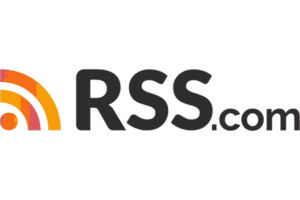
Features:
– Unlimited podcast storage and episode length
– Multi-channel distribution to major directories
– Detailed analytics on listener demographics and engagement
– Integration with third-party services for monetization
– Social media sharing capabilities
– User-friendly interface for ease of use
RSS.com, a seasoned player in the podcast hosting scene since 2005, offers a comprehensive solution. With a focus on simplicity and versatility, RSS.com caters to both novice podcasters and seasoned pros alike. Their platform provides unlimited podcast storage and episode length, making it perfect for creators who produce frequent or large-sized episodes. While RSS.com lacks built-in audio editing features and support for private podcasting, its user-friendly interface and robust capabilities more than compensate for these limitations.
RSS.com stands out for its emphasis on podcast monetization, offering integration with third-party services like Podcorn for sponsorships and Patreon for listener support. Additionally, their multi-channel distribution ensures broad visibility by automatically submitting podcasts to major directories such as Apple Podcasts and Spotify. Detailed analytics provide valuable insights into listener demographics and engagement, empowering creators to refine their content strategy and grow their audience.
Pros:
– Budget-friendly options available
– Robust capabilities for podcast monetization
– Automatic submission to major podcast directories
– Accessible to both beginners and experienced podcasters
– Discounts for annual subscriptions
Cons:
– Lack of built-in audio editing features
– Limited support for private podcasting
– Some features may require integration with third-party services
4. Transistor.fm – Best podcast Host for Analytics
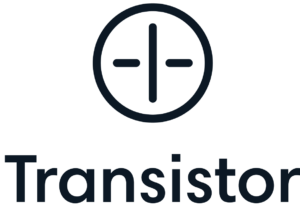
Features:
– Intuitive drag-and-drop interface for easy podcast management
– Private podcast feeds available for all pricing levels
– Automatic posting of audio podcasts to YouTube
– Unlimited team members allowed per account
– Responsive embedded players for seamless sharing
– Integration with email newsletter software and social media platforms
– Dynamic audio insertion for enhanced customization
– Multiple public and private podcast feeds supported
– Comprehensive analytics, including download numbers and subscriber count tracking
– Episode Comparison feature for analyzing performance over time
Transistor.fm shines as a top podcast host, particularly for its robust analytics capabilities. Its intuitive interface and flexible pricing structure make managing multiple podcast feeds effortless. With features like private podcast feeds, automatic YouTube posting, and unlimited user logins, Transistor.fm caters to diverse podcasting needs. Moreover, its seamless integration with various analytics tools and services allows podcasters to track essential metrics such as downloads, subscribers, and audience engagement.
Notably, the platform recently introduced an Episode Comparison feature, simplifying data analysis by displaying daily download numbers for different episodes. Additionally, Transistor’s dynamic audio insertion feature enhances content customization, while its pricing tiers, based on download and subscriber activity, ensure scalability for growing podcasts. Despite the competitive landscape, Transistor.fm stands out for its simplicity, ease of use, and value for money, making it an excellent choice for podcasters seeking comprehensive analytics and premium hosting services.
Pros:
– User-friendly interface makes podcast management simple
– Flexible pricing structure based on download and subscriber activity
– Robust analytics provide valuable insights into podcast performance
– Integration with various third-party services enhances functionality
– Dynamic audio insertion allows for easy content customization
– Private podcast feeds cater to exclusive content distribution needs
– Responsive customer support and extensive knowledge base available
Cons:
– Pricing based on download and subscriber activity may not be suitable for all podcasters
– File size limits for audio uploads may restrict certain content creators
– Lack of integration with advertising networks may limit monetization options
5. Castos
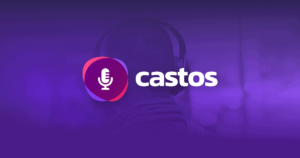
Features:
– Seriously Simple WordPress plugin for seamless integration
– Unlimited podcasts and episodes
– Renewable energy operation
– Extensive analytics
– Customizable podcast players
– Automated YouTube republishing
– Integrated transcription capabilities
– Responsive podcast websites
– Collaborative tools
Castos stands out as an exceptional podcast hosting platform, particularly for WordPress users seeking seamless integration. With a strong focus on podcast growth and monetization, Castos offers a range of features to enhance podcast management.
The Seriously Simple WordPress plugin streamlines workflows, transforming WordPress sites into efficient podcast hubs. Castos boasts unlimited podcasts and episodes, catering to creators of all levels. Its renewable energy operation aligns with sustainability goals while maintaining service excellence.
Despite download caps and subscriber limits, Castos offers extensive analytics, customizable podcast players, and automated YouTube republishing. The platform’s commitment to accessibility is evident through integrated transcription capabilities and responsive podcast websites.
Castos prioritizes user experience, evident in its intuitive dashboard and collaborative tools. While video podcasting is exclusive to higher-tier plans, Castos remains an accessible and valuable resource for small to medium-sized podcasters seeking growth opportunities within a user-friendly platform.
Pros:
– Streamlined workflows with the Seriously Simple WordPress plugin
– Unlimited podcasts and episodes for creators of all levels
– Commitment to sustainability through renewable energy operation
– Detailed analytics to track podcast performance
– Customizable podcast players for enhanced branding
– Automated YouTube republishing for expanded reach
– Integrated transcription capabilities for accessibility and SEO
– Responsive podcast websites for optimized user experience
– Collaborative tools for teamwork and efficiency
Cons:
– Video podcasting limited to higher-tier plans
– Download caps and subscriber limits may restrict larger podcasts
In conclusion:
Selecting the best podcast host is essential for maximizing the reach and impact of your podcast. By evaluating features, pros, and cons, you can find the platform that aligns with your goals and budget. Whether prioritizing analytics, monetization options, or ease of use, there’s a podcast hosting service suited to your needs. With the right host, you can streamline production workflows, engage with your audience, and ultimately, take your podcast to new heights of success.